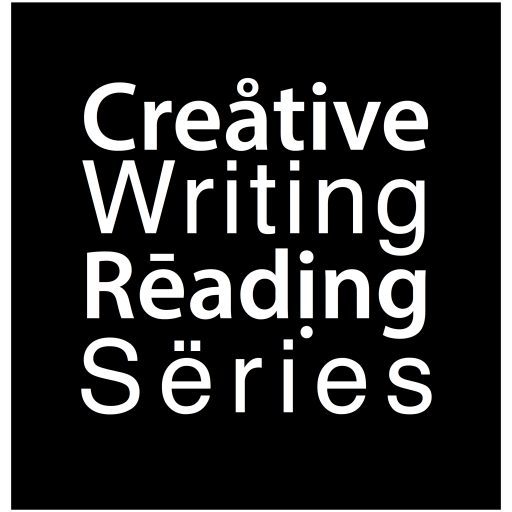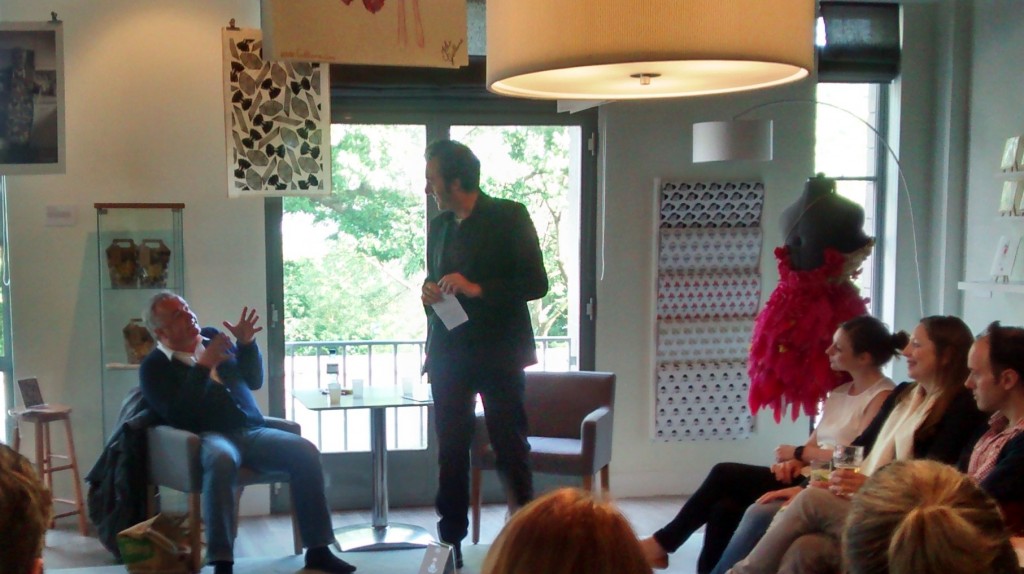The decorous beige face of Keynes SCR is wearing a slightly twisted complexion. Design work on the walls, heads in glass cases, ceramic shopping bags. Flags of oversized print hanging above the audience. A man in an apron flaunting kitchen utensils over the speaker’s right shoulder. Postcards of grimacing Elizabethan clowns dishing out steaming bedpans.
The backdrop of the Fine Arts degree show may have heightened the irreverence, but David Miller doesn’t need much encouragement. Here was plain-speaking from the first moment. Miller interrupted his host (and client) David Flusfeder to rephrase his opening remarks: ‘I’m editing already’. After the postgrad readers – Katie Szyszko’s memories of wheat barns and family tragedy, Alex Carey’s pacifists at an air show, Melissa Hicks’ sentient mirror and Charlotte Geater’s dawn gin & tonic – Miller deflected the attention back to the audience. If we had questions, we were to interject, not wait politely for the end and forget what we wanted to say. ‘I’m not here to do a miserable parody of a Samuel Beckett monologue.’
David Miller has been an agent for half of his life. He schooled in Canterbury, studied theology at university and ‘hadn’t a clue’ what to do next. Then he was tipped off ‘by the woman who was the object of my desires’ about an agent who represented ‘everyone I had ever told her to read’. The agent needed an assistant. Miller sent in his CV, and after three months of silence he phoned to ask if there was a still a post. There wasn’t, but he got an interview anyway, and started soon after as a receptionist at the agency where he still works, Rogers, Coleridge & White. ‘I was a smug twenty-three year old. I didn’t know anything, but I stuck around and now represent the authors I’m proud to have on my client list.’ It’s a list which includes Kent tutors Flusfeder, Scarlett Thomas and Abdulrazak Gurnah. So how do aspiring writers get on it, and what would someone like Miller do for them anyway?
Miller described the literary agent as ‘the ghost in the machine’, a shadowy role that encompasses counselling, representation, being a middle man, handling money, nursing bruises, industrial espionage, match-making and ‘acting as a Jiminy Cricket’. By way of explanation, Miller read an extract from the work of one client, Keith Ridgway, featuring a down-at-heel writer lunching with his exuberant agent. The writer, while determined to retain his integrity, is penniless, recently dumped and really just wants to get drunk. The agent, whose significant pauses are intended to suggest import but actually signify confusion, bemoans those publishers who only pay for inconsequential trash, and suggests that the writer gets a job to keep him afloat. Could he teach Creative Writing, perhaps? The writer is horrified. The agent smoothes him down.
Miller batted away applause for his reading. ‘Save it for Keith. Buy his book!’ When asked if this story was typical of the agent-writer relationship, Miller claimed that his relationships with authors are ‘singular’, atypical, and that the whole business is ‘disgustingly promiscuous’. Does every writer need an agent? ‘I have never said that a writer has to have an agent. So why do they?’ Miller puts it down to the amount of legal bureaucracy thrown at them by publishers. ‘A writer wants to go off and write. Some might want to run their own business, in which case they don’t need me to do it for them.’ An agent’s job, Miller said, is to ensure that a writer reaches ‘the audience they deserve’, but he baulks at the sense of entitlement that some writers convey. His own experience as a novelist made him realise that ‘a lot of people whine’, something he has no time for. ‘When I took on the writer Magnus Mills, he drove a bus. He’s written nine books and he still drives a bus. He doesn’t feel entitled.’ By staying in the world of work, Mills is also well placed to gather inspiration for his writing. Miller admires those writers who have ‘lived a bit first’ and started their careers later in life, such as Penelope Lively and Anita Brookner: writers who embrace the ‘slow build’ of a reputation, rather than chasing the money and ‘going for advances’.
Miller conceded that publishers take fewer risks these days. ‘There was more originality and risk-taking twenty years ago’, when publishers were willing to create a readership for new authors. ‘It’s no surprise that people who have won prizes lately have been with smaller publishers, where there’s more ‘room’ for them.’ But publishers have to make their money too. ‘A publisher isn’t a charity.’ As far as Miller is concerned, part of the problem is that books are just too cheap. We’ve lost respect for them. ‘You don’t think twice about spending £10 on a Pizza Express pizza, where the ingredients probably cost 60p. But you if you go into a bookshop and what you want isn’t in the Buy One Get One Free you think you’ve been diddled. Why do we think the price isn’t worth the value?’ While Miller feels that some of the blame for this rests with the publishers and their price wars, and the stranglehold of a few retailers, it is also our fault for ‘not valuing our literary culture’.
Much of what Miller had to say about selecting writers chimed with Lee Brackstone’s talk the week before. ‘Write a good book. Be careful about it, think about it and mean it.’ Miller won’t accept a partial manuscript, although other agents may. He doesn’t need any more clients, so if he takes one on, he knows it’s because he really wants them. Don’t send him your manuscript just because he has published something similar before (‘why would I want it if I’ve already got one?’). He promotes what interests him, which is why his list is ‘all over the place’.
If your idea of an agent combines the starchy non-nonsense comforts of a house matron with the irreverence and comic timing of that Elizabethan clown, David Miller could be the man for you. Find out more about him at http://www.rcwlitagency.com.
Last of the season: Ink, Sweat & Tears and Sabotage Reviews, 11th June; Gallery Beggar Press and & Other Stories, 18th June. Keynes SCR as usual, £2, 6pm start.
Keep writing.
Sonia

